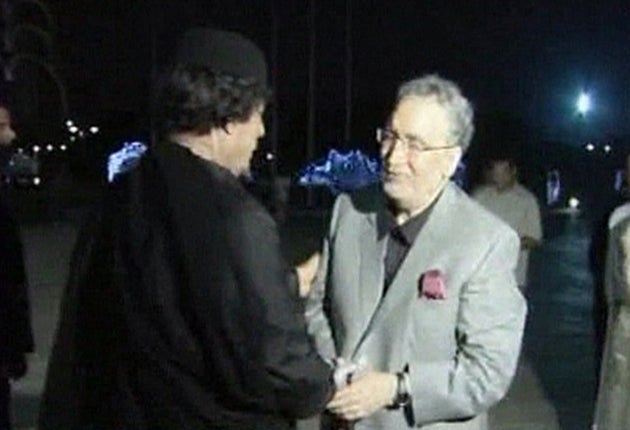Brown urged to reveal role on Megrahi
PM is accused of letting Scottish government take fall for contentious repatriation

Gordon Brown faced further questions last night over his involvement in the release of the only man convicted for the Lockerbie bombing.
As the Prime Minister maintained his silence over the release of Abdelbaset Ali al-Megrahi, it emerged that he discussed the possible arrangements for his return to Libya with Colonel Muammar Gaddafi six weeks ago. Opposition MPs said that suggested Mr Brown was more involved in the process than he is admitting.
Downing Street insists that Mr Brown told the Libyan leader, during the margins of a G8 summit in Italy, that he could not intervene in the Megrahi case because it was a judicial decision for the Scottish government.
On Thursday, the day Megrahi was released, Mr Brown wrote to Colonel Gaddafi urging him to ensure he did not enjoy a "high-profile return" to Tripoli because this would cause "further unnecessary pain" for the families of the Lockerbie victims and undermine Libya's growing international reputation. Mr Brown also told the Libyan leader, in a reference to their 10 July talks: "When we met I stressed that, should the Scottish Executive decide that Megrahi can return to Libya, this should be a purely private, family occasion."
Ed Davey, the Liberal Democrats' foreign affairs spokesman, said: "This letter suggests that the Prime Minister has been actively engaged in this issue for weeks. Perhaps this explains his reticence about giving his view on whether the decision on Megrahi was right or wrong."
Mr Brown's letter also hinted at the commercial links between Libya and Britain. "There are significant shared interests at stake in our relationship and I am committed to working with you to achieve them," he told Col Gaddafi.
British officials insist that the letter did not prejudge the Scottish Government's decision on Megrahi and that any discussion of trade deals was kept entirely separate from the Lockerbie issue.
However, it emerged that Seif Gaddafi, the son of the Libyan leader, told Megrahi during his return flight to Tripoli: "You were on the table in all commercial, oil and gas agreements that we supervised in that period. You were on the table in all British interests when it came to Libya, and I personally supervised this matter. Also, during the visits of the previous prime minister Tony Blair."
Anger among the American relatives of the 270 killed in the Lockerbie bombing could lead to a boycott of goods and services from Scotland and throughout the UK, including visits by Americans. Organisers of a campaign, who have set up a website, believe the British Government was involved and have called for boycotting of, among others, BP petrol stations in the US.
The Tories renewed their call for a statement by Mr Brown. Liam Fox, the shadow Defence Secretary, said: "This is a disgraceful situation. It flies in the face of natural justice.
"Most people will think it is nonsensical and would expect Gordon Brown as Prime Minister of the UK to say something about it. But as ever, when the going gets tough, Gordon Brown goes to ground. He makes all sorts of statements about celebrity, about sporting events, but when we face a major issue about the United Kingdom's prestige about how we are perceived overseas about a major question of justice, Gordon Brown is silent."
Kenny MacAskill, the Justice Secretary in the Scottish National Party government in Edinburgh, faces tough questions today from rival politicians during an emergency session of the Scottish Parliament amid growing criticism of his decision to release Megrahi on compassionate grounds.
Jack McConnell, Labour's former First Minister in Scotland, accused the SNP government of a "grave error of judgment" which had damaged Scotland's reputation and brought "shame" on the country.
Join our commenting forum
Join thought-provoking conversations, follow other Independent readers and see their replies
Comments
Bookmark popover
Removed from bookmarks